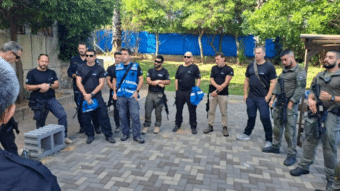While public clashes over military conscription dominate the headlines, a quieter, more optimistic trend is taking shape: a growing wave of young ultra-Orthodox men are enrolling in training programs for construction-related professions and starting to take their place on construction sites. The pay is high, the environment is naturally male-only, the rabbis are supportive, and the employers are thrilled: “If you’ve studied Gemara, construction blueprints are a breeze.”
By Nimrod Buso, Nadlan Center
Every morning, 26-year-old Avraham Vichleder, a Slonimer chassid from Beitar Illit, commutes to Jerusalem. From the outside, he’s just one of tens of thousands of people making their way from ultra-Orthodox towns and cities to the capital to study or work in one of the city’s many religious institutions. But Vichleder is going somewhere else: he’s the site manager for Orenstein Construction in the Arnona neighborhood, where he’s been overseeing the entire site for several months.
Although Vichleder is the son of a well-known contractor in the ultra-Orthodox community, he insists he didn’t grow up around construction. When he finished his religious studies and decided to “enter the working world,” as he puts it, he initially worked in event production. “But once I started a family, evening work no longer suited me.” That’s when he was approached by Melachtom, a nonprofit that promotes vocational training in the ultra-Orthodox sector, and offered a full scholarship to become a certified construction site manager. After six months of coursework and nine months of on-site training, he’s finally launching his new career.
“It’s hard to think of a more suitable workplace for ultra-Orthodox men than a construction site,” he says. “In terms of modesty, it’s the most appropriate environment—no women work on-site. Regarding kashrut, there’s no office kitchenette—everyone brings their own food from home. And since many sites don’t operate on Fridays, it aligns well with our observance of Shabbat. Employers benefit too. I don’t have a smartphone, so I’m not distracted on the job.”
So how does a young ultra-Orthodox man feel working in a field often associated with Arab, Chinese, or Moldovan laborers? Vichleder says the picture on the ground is very different. “The CEO and owner of the company I work for are ultra-Orthodox. They strongly support integrating ultra-Orthodox workers into the industry. Many of their employees and subcontractors—electricians, plumbers, underfloor heating installers—are also ultra-Orthodox. The wet work is done by Chinese laborers. Each team has a bilingual crew leader who speaks Hebrew and Chinese. But overall, there are many Jewish workers on-site.”
“It’s hard to think of a more suitable workplace for ultra-Orthodox men than a construction site. No women on-site, everyone brings kosher food from home, and employers benefit too—like not having employees glued to their phones.”
Avraham Vichleder (26), Beitar Illit resident and newly certified site manager
Overall, is he satisfied?
“Very! The training was short and fully funded, and now I’m in a respected profession with a great salary. I tell other ultra-Orthodox youth—if you’re thinking of joining the workforce, come train as a site manager. After just six months, you start working. As a trainee, I’m earning 10,000 shekels a month. Once certified, salaries can reach 22,000–23,000 shekels and even higher.”
“Salaries can reach 40,000 shekels a month”
Vichleder’s entry into the field at this particular time is no coincidence. His training is part of a broad initiative led by the Foundation for the Encouragement and Development of the Construction Industry—a joint effort by the Israel Builders Association and the Histadrut (General Federation of Labor). The goal: encourage more Israelis to join the construction workforce. The October 7 Hamas attack led to the sudden removal of around 100,000 Palestinian construction workers in Israel, creating a severe labor shortage. In response, the Foundation set up training tracks for Israeli workers in a range of trades—site managers, safety assistants, heavy equipment operators, finishers, electricians, and stone masons.
In 2024 alone, the Foundation trained 2,000 Israeli workers, including 400 ultra-Orthodox men. CEO David Yahalomi says that this trend is expected to continue in 2025: “According to the Central Bureau of Statistics, 8,000 ultra-Orthodox were employed as construction workers in Israel in the first quarter of 2024—3.7% of all Israeli construction workers—an increase of 2,000 from 2023. That’s a significant achievement, and we expect the numbers to keep rising.”
When did the fund begin focusing on the ultra-Orthodox sector?
“From the moment I took the role two years ago, I made integrating ultra-Orthodox workers into the industry one of the fund’s goals,” says Yahalomi, “Even before the October 7 crisis, which opened everyone’s eyes to the severe labor shortage in construction. I believed in this from the start—this is a large community of people who are very well suited to the industry.”
What makes them suitable?
“There’s a myth that the ultra-Orthodox don’t work and all want to stay in yeshiva. That’s not accurate. According to the CBS, 62% of ultra-Orthodox Israelis work, including 55% of men. So yes, it’s relatively low, but still, a significant portion work and earn a living.”
“And now you’re offering them a position with very high wages. A site manager starts at 15,000–17,000 shekels a month, and can get up to 35,000 or 40,000. Safety assistants are also in demand. Even a simple construction worker can earn 600-900 shekels a day. How many fields pay like that? Think of an ultra-Orthodox guy who worked off the books or lived off 1,800 shekels a month—suddenly he’s making 14,000 a month. What does that do for his family? What does it do for the economy?”
How do you begin this process within the ultra-Orthodox community?
According to Yulia Novik-Alush, VP of Development and Strategy at the Foundation for the Encouragement and Development of the Construction Industry, “The success of such a move depends not only on high-quality professional training, but also on close collaboration with key government and philanthropic partners like BIZMAX, the Tevet department of the American Jewish Joint Distribution Committee (JDC), and Melachtom, who bring deep experience in tailored employment support—for both the ultra-Orthodox population and employers. Through close cooperation, we’re building the infrastructure for true, long-term integration.”
“The experience of contractors hiring ultra-Orthodox workers is outstanding, and after they see how well it works, they want more. In the end, they’re very hardworking, and also known for their high moral standards. In their world, there’s a concept called ‘gezel’ (theft). If an ultra-Orthodox worker makes a personal phone call during work hours, then according to Torah and their value system, that’s considered theft. It’s no secret that theft is a significant problem on construction sites. An ultra-Orthodox worker won’t take a single screw—certainly not a screwdriver.
David Yahalomi, CEO of the Foundation for the Encouragement and Development of the Construction Industry
Yahalomi adds that throughout these discussions, “it became clear that ultra-Orthodox community leaders aren’t opposed to this phenomenon. On the contrary, even before October 7, we brought MK Yitzhak Issachar Goldknopf (Israel’s Minister of Housing and Construction) to visit one of the vocational colleges that trains ultra-Orthodox workers, and he said: ‘I call on the ultra-Orthodox public to work in construction.’ That’s on record.”
“Torah study is still the most important”
Despite Yahalomi’s optimism, there are still plenty of sensitivities and complexities surrounding this issue. The biggest one is the ideal of the ultra-Orthodox community’s commitment to full-time Torah study, which also forms the central rationale for exemption from military service. A person who spends their day—from 7 a.m. to 6 p.m.—on a construction site, is obviously not studying in kollel. On this issue, the ultra-Orthodox public does not have one, solid stance, with each stream or sect drawing different conclusions based on its priorities, values, and lifestyle.
The Sephardi public is considered the “least problematic” on this issue, as male employment for family support is generally accepted. That leaves the two Ashkenazi streams—the Litvaks (Lithuanian) and the Chassidim. Among Litvaks, the Torah study ideal is stronger, and the social stigma of leaving the yeshiva world is correspondingly higher. Among Chassidim, the notion that the father should bear the burden of livelihood is more accepted, and going out to work is not viewed as shameful. Compared to Litvaks, this group also has a greater aversion to the academic and scientific world. The combination of these two factors—social legitimacy for men to work and avoidance of academic professions—makes Chassidic men especially well-suited to technical trades and manual labor.
“We don’t approach people who are still learning in kollel, only those who have already started working, and we help them upgrade their situation. We never claim that work is more important than Torah study. Even those who work find time to study, so there’s no contradiction.”
Hillel Stein, CEO, Melachtom
Melachtom has trained nearly 2,000 ultra-Orthodox young men for various professions since it was founded about six years ago, including around 150 site managers. The organization has also trained electricians with construction-specific certification, insurance agents, bookkeepers, and mortgage advisors.
According to Stein, the two main factors for selecting training programs are that the course isn’t too long and that it provides high earning potential. Most of the organization’s funding comes from American ultra-Orthodox philanthropists who see employment as a way to improve the community’s situation in Israel. “We have backing from every community and every rabbi,” Stein emphasizes. “Still, most scholarship recipients so far have come from Chassidic communities.”
How does your outreach to ultra-Orthodox youth align with the Torah study ideal?
“We have to separate between those who are still learning in kollel every day and those who aren’t. We only work with the latter, helping them upgrade their employment situation. But again, we never say work is more important than Torah. We held a big alumni conference with the organization’s donors from the U.S. They gave speeches and said—‘Don’t forget what really matters in life.’ So there’s no contradiction.”
When do construction site managers have time to study?
“Everyone sets their own study time. Some study in the evenings, some get up early before work. In one case I visited a construction site that was temporarily paused, and I found one ultra-Orthodox worker sitting in a corner with a book, using the time to learn.”
Most people associate construction work with non-Jews. Is there a challenge in dealing with those stereotypes?
“To some extent. But during training, there’s a section dedicated to the social environment they’ll encounter on-site, who they’ll be working with, and how to interact with them. I didn’t notice any particular issues in that regard. Besides, site managers and supervisors aren’t manual laborers—these are roles you can grow into. Also, there’s a ‘friend brings friend’ effect, where ultra-Orthodox workers bring more people from their communities into the field.”
Stein expects some of the training graduates will eventually open their own contracting companies: “Some are already talking about it. And when that happens, they’ll recruit others from their sector. I strongly recommend this path—it’s quality work, and I feel we were fortunate to be pioneers in integrating the ultra-Orthodox into the field. We were initially skeptical, but today we see our alumni working in companies, and more and more classes are opening.”
Another body acting as a “bridge” between the construction industry and the ultra-Orthodox community is the JDC’s Tevet division, which develops programs to boost productivity in Israel’s economy. According to Yisrael Yom Tov, head of ultra-Orthodox programs at JDC, the organization recently launched a dedicated project called “Yesodot” to integrate ultra-Orthodox manpower into construction. In addition to already training around 150 workers, the organization is helping small ultra-Orthodox-owned construction and renovation firms—already common in the sector—grow.
“They have a very steep learning curve, but they’re very intelligent, and they really get it. I’m very happy they’ve joined my company and become part of it. About a week ago, the first of them completed his internship and received his site manager certificate. Of course, he stayed with me, and today he’s a site manager in every sense. Not long ago, they were yeshiva students living on a small stipend, and now even during the internship, they’re earning 13,000 shekels a month. After certification, the salary goes up to 15,000 and sometimes even 17,000 shekels. I’m happy to pay them those salaries because they give me peace of mind on site. They’re very committed and quick learners.”
Shai Aharonian, owner of Yarom Or construction company
“Our goal is to take small ultra-Orthodox renovation contractors and help them grow—so they can take on larger and more significant projects. We believe this will attract new workers to the industry. If today there’s an ultra-Orthodox contractor employing ten workers, after getting larger projects, he’ll employ 30. Some of those 30 will be from his community, which helps us boost the industry and productivity.”
How do you reach potential workers and encourage them to start training?
“It’s not simple. It depends on the relationships we’ve built over the years to reach the communities. In the end, there’s a road you have to cross. There’s a lot of quality human capital on the right side of the road—some of them definitely want to cross to the employment side. We’re trying to tilt the funnel toward the construction industry, and in this process, you need more than one hand to help. To cross the road, you need two hands—because working on a construction site isn’t like working in an office. It’s made up of many types of people. It’s rough, it’s tough, it starts early—but among ultra-Orthodox youth, there are those for whom this kind of work is a perfect fit.”
“A very steep learning curve”
And how willing are contractors to employ ultra-Orthodox workers today? Apparently, very willing—if only because the massive shortage of labor in the industry leaves them little choice. But according to Shai Aharonian, owner of Yarom Or, which builds luxury residential buildings and preservation projects in Tel Aviv, what began as an immediate crisis solution has proven to be a rather successful one.
“Until October 7, I had more than one hundred Palestinian workers and engineers employed in my company. They all lived in rented apartments in Tel Aviv and would go home once every week or two,” he recounts. “When the war broke out, in a single day, I had no more workers. You’re left exposed and alone. So I started mainly recruiting foreign workers. Today I have workers from seven countries on site—Thailand, Sri Lanka, Sudan, Ukraine. It’s not easy because each one speaks a different language. The most powerful tool on the construction site today is Google Translate.”
Alongside all this, Aharonian also independently recruited several ultra-Orthodox workers. At a certain stage, the Foundation offered to send them for site manager training with the understanding that they would return to him for their internship period. “They took the site manager course, where they are completing their training for certification on our site.”
Aharonian has nothing but praise for his ultra-Orthodox workers: “They have a very steep learning curve, but they’re very intelligent, and they really get it. I’m very happy they’ve joined my company and become part of it. About a week ago, the first of them completed his internship and received his site manager certificate. Of course, he stayed with me, and today he’s a site manager in every sense. Not long ago, they were yeshiva students living on a small stipend, and now even during the internship, they’re earning 13,000 shekels a month. After certification, the salary goes up to 15,000 and sometimes even 17,000 shekels. I’m happy to pay them those salaries because they give me peace of mind on site. They’re very committed and quick learners.”
“Our goal is to take small ultra-Orthodox renovation contractors and help them grow—so they can take on larger and more significant projects. We believe this will attract new workers to the industry. If today there’s an ultra-Orthodox contractor employing ten workers, after getting larger projects, he’ll employ 30. Some of those 30 will be from his community, which helps us boost the industry and productivity.”
Yisrael Yom Tov, Director of Ultra-Orthodox Programs at the JDC:
Did integrating ultra-Orthodox workers into your construction sites require you to make any adjustments?
“No. The only issue is during chol hamoed, when they don’t work. But I accept that with love, I respect them, and I make sure to scale back activity on those days to almost zero. That’s fine—nothing will happen if for three or four working days, productivity is lower or the site is closed. I shut the site during this past Passover and didn’t feel any loss.”
To what extent do you recommend your colleagues in the industry hire ultra-Orthodox workers?
“Highly recommend. They’re very loyal people, they think ahead, and they help push the company forward.”
Yahalomi also says he receives excellent feedback from the field. “The experience of contractors hiring ultra-Orthodox workers is outstanding, and after they see how well it works, they want more,” he says. “In the end, they’re very hardworking, and also known for their high moral standards. In their world, there’s a concept called ‘gezel’ (theft). If an ultra-Orthodox worker makes a personal phone call during work hours, then according to Torah and their value system, that’s considered theft. It’s no secret that theft is a significant problem on construction sites. An ultra-Orthodox worker won’t take a single screw—certainly not a screwdriver.
“On top of that, we get feedback from the training programs that they’re very sharp and learn quickly. If you’ve studied Gemara, this is easy. So the more ultra-Orthodox who enter the field, the more contractors will want them. Ultimately, the goal of these training programs is to reduce our reliance on foreign labor. We won’t be able to eliminate it completely, but we can certainly reduce it.”

Nadlan Center is Israel’s leading real estate news and knowledge platform in Hebrew, created for industry professionals. Founded by experts in the field, it delivers in-depth, up-to-date coverage on urban renewal, planning and construction, taxation, and housing policy — tailored to the needs of developers, investors, planners, and financiers. In addition to its widely read news content, Nadlan Center hosts major industry events, professional conferences, and training programs that support the growth and development of the Israeli real estate sector.
Learn more: https://www.nadlancenter.co.il







